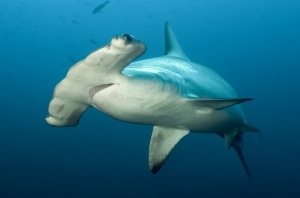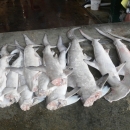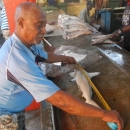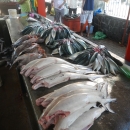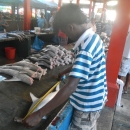Keeping the future of Hammerhead sharks alive
MFF assists artisanal fishers conserve and protect scalloped hammerhead shark in the Seychelles
Location: Mahe, Seychelles. 30th Apr 2015
Artisanal shark fishermen in Seychelles practice wise use of all their entire shark catch. They land the whole shark and utilise its meat, skin, fins, stomach, teeth and jaws. They are not involved in the unsustainable practise of “finning” where the fins of the animal are taken and the body discarded, because the meat in particular is an important source of income for them and a popular source of cheap high quality protein on the local market.
Fins are still prized, however, and exported to overseas markets. The Convention on International Trade in Endangered Species (CITES), to which Seychelles is a party, decided at its 16th Conference of the Parties in 2013 to list the Scalloped hammerhead in Appendix II which means since September 2014 the export of products from this species requires a CITES permit. To comply with its CITES obligations the Seychelles CITES Authority, that resides with the Ministry of Environment, should only issue permits where "the export will not be detrimental to the survival of the species".
The Seychelles government currently has no data on the Scalloped hammerhead (Sphyrna Iewini) population and its fishery on the Mahé plateau. This is where the Artisanal Shark Fishers Association (ASFA) and its research partners can help. ASFA and its members and partners have been collecting shark catch data for three years. This year, through a grant from MFF, special focus will be placed on studying the catch of scalloped hammerheads from: the seasonal targeted fishery; the broader hand line fishery; and the by-catch of juveniles in the mackerel fishery.
The fishery survey project will also include some DNA analysis, to determine genetic distinctiveness, diversity, and the genetic criteria of an effective population size--an indicator of the number of breeding females. This indicator can provide the basis for assessing the sustainability of artisanal shark fishing, which can then support the basis for which CITES permits for hammerhead sharks can be issued.
Read more about the progress in hammerhead shark conservation and fishery from the MFF Seychelles project, "Assessment of the Scalloped Hammerhead (Sphyrna Iewini) shark population and fishery to provide a basis for its sustainable management." The MFF small grant project was also featured in the Seychelles daily newspaper, The Nation, in the article "Mangroves for the Future supports scalloped hammerhead shark fishery survey", published 27 April 2015 (see http://www.nation.sc/article.html?id=245223).
MFF has been operational in Seychelles since 2007 with a local office co-located at the UNDP national office in Victoria, Mahe. Other MFF activities in Seychelles include projects on habitat restoration, biodiversity protection and the promotion of sustainable development. Part of its national strategy is to seek promotion of local community and private sector involvement in coastal resources management.
